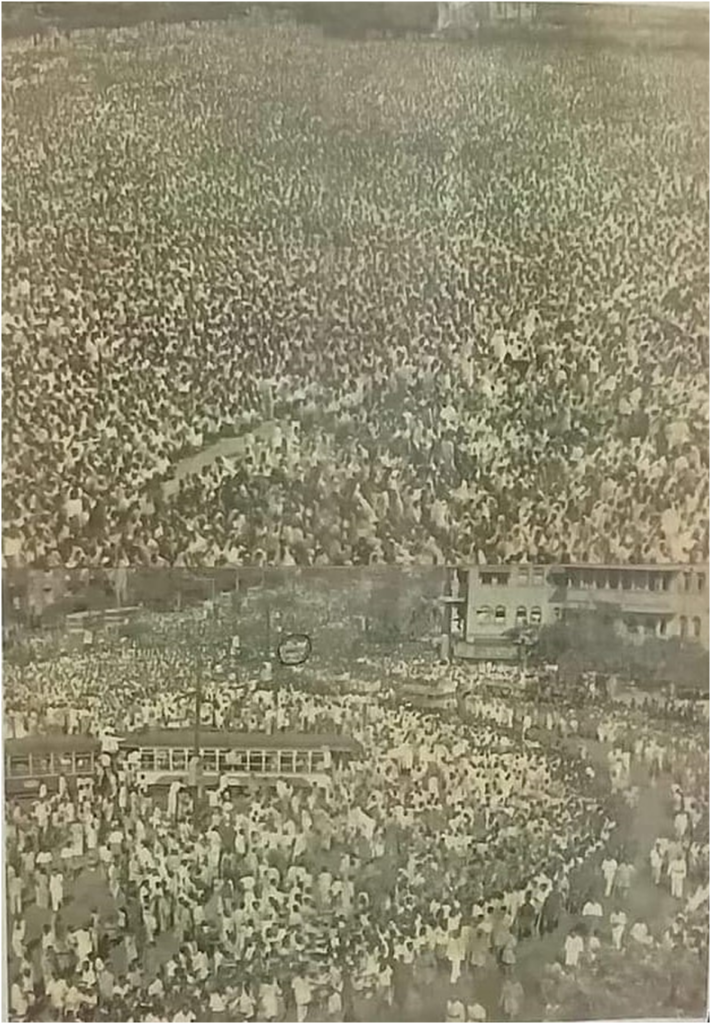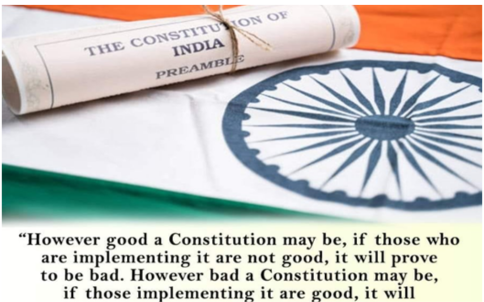Dr.Madabhushi Sridhar Acharyulu, Professor and Advisor of School of Law, Mahindra University, Hyderabad. (6.12.2023)
People’s Poet Padma Bhushan Kaloj Narayana Rao’s famous statement says: “Your birth was yours, and your death was yours, but rest of life was for the nation” (batukuneedi, chaavuneedi, bratukantaa deshanidi”. This statement is apt for B R Ambedkar.
He told the people of the nation, saying “However good a constitution may be, if those who are implementing it are not good, it will prove to be bad”.

Ambedkar’s memorial
Born in 1891
Ambedkar was born on 14 April 1891 in a small house in a military cantonment of MHOW (Military Home of War) now (officially known as Dr Ambedkar Nagar) in Madhya Pradesh).[5] His father was an ordinary Subedar in army office, born as 14th and last child of Ramji Maloji Sakpal, and Bhimabai Sakpal, daughter of Laxman Murbadkar.[6] He hailed from the town of Ambadawe (Mandangad taluka) in Ratnagiri district of Maharashtra.
Ambedkar faced discrimination ever since birth, into a Mahar (dalit) caste. He has grown with treatment as untouchable and was subjected to socio-economic discrimination. Ambedkar’s ancestors had long worked for the army of the British East India Company, and his father served in the British Indian Army. Ambedkar attended school, but classified as one of the segregated untouchable children. They were not allowed to sit inside the class. When they needed to drink water, someone from a higher caste had to pour that water from a height as they were not allowed to touch either the water or the vessel that contained it. His plight was that he could get on only with the support of the school peon, and if the peon was not available then he had to go without water; he described the situation later in his writings as “No peon, No Water”. He was required to sit on a gunny sack which he had to take home with him.
Ambedkar had grown to become in 1935, a proud Principal of the Government Law College, a famous part of Bombay University. He served as the chairman of Governing body of Ramjas College, University of Delhi, after the death of its Founder Shri Rai Kedarnath
In 1936, Ambedkar founded the Independent Labour Party. He was a very popular leader. His party contested the 1937 Bombay election to the Central Legislative Assembly for the 13 reserved and 4 general seats, and won 11 and 3 seats respectively.
Ambedkar while justifying the Partition of India, he condemned child marriage and the mistreatment of women in Muslim society.No words can adequately express the great and many evils of polygamy and concubinage, and especially as a source of misery to a Muslim woman. Take the caste system. Everybody infers that Islam must be free from slavery and Hinduism should get rid of caste. […] [While slavery existed], much of its support was derived from Islam and Islamic countries. While the prescriptions by the Prophet regarding the just and humane treatment of slaves contained in the Koran are praiseworthy, there is nothing whatever in Islam that lends support to the abolition of this curse. But if slavery has gone, caste among Musalmans [Muslims] has remained.
The architect of Constitution of India, Ambedkar, on principles in 1951, Ambedkar resigned from Nehru’s cabinet after Hindu code bill was defeated in Parliament.
Then, Ambedkar contested in the Bombay North first ever General Election of 1952, but lost to his former assistant and Congress Party candidate Narayan SadobaKajrolkar. Ambedkar became a member of Rajya Sabha, probably an appointed member. He tried to enter Lok Sabha again in the by-election of 1954 from Bhandara, but he came third (the Congress Party won).
Death
By the time of the second general election in 1957, he could not survive. Since 1948, Ambedkar had diabetes. He remained in bed from June to October in 1954 due to medication side-effects and poor eyesight. His health worsened during 1955. Three days after completing his final manuscript The Buddha and His Dhamma, Ambedkar died in his sleep on 6 December 1956 at his home in Delhi.
Who laid a foundation
He does not know but, his parents know about his birth. His death was yours, but whole entire is lived for nation. Not just for the nation, but one can say that life was for whole of the world. His contribution to the Constitutionalism is universal and Rule of Law.
Every backward class, especially Scheduled Caste, Ambedkar was a great champion, besides being a world class statesman. Each provision and principle of the Constitutional placed a strong foundation as democratic nation.
Lived for a Nation
Though we became independent in 1947, the nation prepared this Constitution which was commenced in 1950. But the significant part of the Constitution of India commenced on 26th November 1949, two months before the Republic Day on 26th January 1950, including the right to vote. Interestingly the right to vote was ‘given’ two months before. But the right to life was recognized (not ‘given’) on Republic Day, so the right to vote is the ‘right to speech’ which is part of the expression. It is a fundamental right, without young students remembering it.
Generally, Constitutional experts appreciate every phrase in the Preamble as specially selected by the framers of the Constitution of India, especially BR Ambedkar. It is based on the ideals behind the Preamble laid down by Jawaharlal Nehru’s Objectives Resolution, adopted by the Constituent Assembly on January 22, 1947. Although not enforceable in court, the Preamble states the objectives help aid during the interpretation of Articles when language is found ambiguous.
This is important among many objectives but emphasize ‘dignity’. The people ignore this important point. The PMs and CM’s manifestoes promise food, shelter, and clothing. Are these three enough? What about dignity?
The most important point is the Fraternity along with the word “dignity”. Ordinarily, it is referred to as ‘Fraternity’ means a feeling of brotherhood and an emotional attachment to the country and all the people. However, the fraternity helps to promote dignity and unity in the nation. We need to emphasize ‘dignity. That provides a way of life. It includes fraternity, liberty, and equality as the notion of a happy life that cannot be taken from each other.
- Liberty cannot be divorced from equality; equality cannot be divorced from liberty. Nor can liberty and equality be divorced from fraternity.
- Without equality, liberty would produce the supremacy of the few over the many.
- Equality without liberty would kill individual initiative.
- Without fraternity, liberty would produce the supremacy of the few over the many.
- Without fraternity, liberty, and equality could not become a natural course of things.
Dignity means that every person has the inalienable right to live with dignified life without discrimination. The right to live with human dignity is one of the fundamental rights guaranteed under Article 21. They are entitled to claim equal respect from the state as well as from other persons.
In Maneka Gandhi v. Union of India, the Supreme Court gave a new dimension to Art. 21. The Court held that the right to live is not merely a physical right, but includes within its ambit the right to live with human dignity.
With decisions on Aadhaar, IPC 377, and the right to privacy, the Supreme Court has reaffirmed the centrality of human dignity to the Constitution. The concept was invoked 120 times in the privacy decision, and 128 times in Navtej Johar. Despite the enthusiasm of the courts, there is growing scepticism about the application of dignity.
The principles founded in the Preamble, explains Ambedkar: “Law and order are the medicine of the body politic and when the body politic gets sick, medicine must be administered.”




